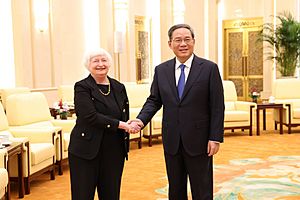Li Qiang facts for kids
Quick facts for kids
Li Qiang
|
|||||||||||||||
|---|---|---|---|---|---|---|---|---|---|---|---|---|---|---|---|
| 李强 | |||||||||||||||
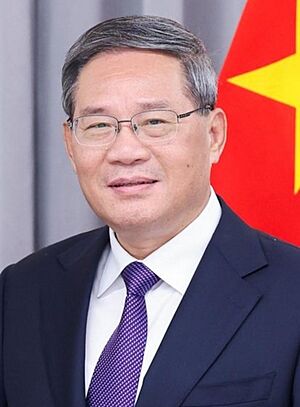
Li in 2024
|
|||||||||||||||
| Premier of China | |||||||||||||||
| Assumed office 11 March 2023 |
|||||||||||||||
| President | Xi Jinping | ||||||||||||||
| Vice Premier |
|
||||||||||||||
| Preceded by | Li Keqiang | ||||||||||||||
| Party Secretary of Shanghai | |||||||||||||||
| In office 29 October 2017 – 28 October 2022 |
|||||||||||||||
| Mayor |
|
||||||||||||||
| Preceded by | Han Zheng | ||||||||||||||
| Succeeded by | Chen Jining | ||||||||||||||
| Party Secretary of Jiangsu | |||||||||||||||
| In office 30 June 2016 – 29 October 2017 |
|||||||||||||||
| Governor |
|
||||||||||||||
| Preceded by | Luo Zhijun | ||||||||||||||
| Succeeded by | Lou Qinjian | ||||||||||||||
| Governor of Zhejiang | |||||||||||||||
| In office 30 January 2013 – 4 July 2016 Acting: 21 December 2012 – 30 January 2013 |
|||||||||||||||
| Party Secretary | Xia Baolong | ||||||||||||||
| Preceded by | Xia Baolong | ||||||||||||||
| Succeeded by | Che Jun | ||||||||||||||
| Personal details | |||||||||||||||
| Born | July 1959 (age 66) Rui'an, Zhejiang, China |
||||||||||||||
| Political party | Chinese Communist Party | ||||||||||||||
| Alma mater |
|
||||||||||||||
| Signature |  |
||||||||||||||
| Chinese name | |||||||||||||||
| Traditional Chinese | 李強 | ||||||||||||||
| Simplified Chinese | 李强 | ||||||||||||||
|
|||||||||||||||
Li Qiang (born July 1959) is a Chinese politician. He has been the premier of China since March 2023. The premier is like the head of government in China. He is also the second most important member of the Politburo Standing Committee of the Chinese Communist Party, which is a top leadership group. Before becoming premier, Li Qiang was the main leader (party secretary) of Shanghai from 2017 to 2022. In Shanghai, he supported businesses and managed the city's response to the COVID-19 pandemic.
Li Qiang is seen as a close supporter of Xi Jinping, who is China's top leader. Their close relationship began in the mid-2000s when they both worked in Zhejiang Province. Many people see Li Qiang as someone who supports businesses and wants to make economic changes.
Contents
Early Life and Education
Li Qiang was born in July 1959 in Rui'an, a city in Zhejiang, China. His father worked for the government, and his mother sold pork. Li Qiang was cared for by his grandmother when he was young. He finished primary and secondary school in Mayu.
After school, he worked at an irrigation pump station and then at a tool factory. From 1978 to 1982, he studied agricultural machines at the Ningbo Branch of Zhejiang Agricultural University. He also studied sociology through a special program from 1985 to 1987.
Later, Li Qiang continued his studies while working. He studied management engineering at Zhejiang University from 1995 to 1997. He also studied world economics at the Central Party School of the Communist Party of China from 2001 to 2004. In 2005, he earned a business degree (EMBA) from Hong Kong Polytechnic University.
Early Career Steps
Li Qiang joined the Chinese Communist Party (CCP) in April 1983. He started working for the Communist Youth League of China in Rui'an County. He then moved up through different roles in the civil affairs department of Zhejiang Province. This department helps people with things like disaster relief.
In 1996, he became a leader in the city of Jinhua and then the party secretary of Yongkang. He later worked in the Zhejiang Provincial Government's main office. In 2000, he became the head of the Bureau of Administration for Industry and Commerce in Zhejiang.
In 2002, at 43 years old, he became the youngest party secretary of Wenzhou. In this role, he supported private businesses and light industry in the city. In 2004, he became a key assistant to Xi Jinping, who was then the party secretary of Zhejiang. During this time, Li Qiang became a close ally of Xi Jinping. He helped create the "Double Eight Strategy," which was a plan to improve Zhejiang Province.
Li Qiang believed that local governments needed independent experts to give honest feedback on their work. This led to a group of experts being formed in 2009, with Li Qiang as an honorary director. In 2011, he became a deputy party secretary in Zhejiang.
Leading in Different Regions
Zhejiang (2012–2016)
In December 2012, Li Qiang became the acting governor of Zhejiang, and then the official governor in January 2013. As governor, he continued to ask experts for honest reports on his performance. He also worked to make government processes simpler in Zhejiang.
In 2014, Li Qiang suggested that a city hosting an international internet conference should allow more open internet access for Western companies. This idea was not approved by the central government. He also started a project to create "characteristic towns." These were small towns focused on one type of business, like "Dream Town" for tech companies or "Chocolate Town" for chocolate makers. This idea was later supported by Xi Jinping and spread across China.
Jiangsu (2016–2017)
On June 30, 2016, Li Qiang became the party secretary of Jiangsu province. He served in this role for about 15 months, which was the shortest time for a Jiangsu party secretary in the history of the People's Republic of China. During his time there, he met with business leaders like Jack Ma of Alibaba Group to encourage investments.
Shanghai (2017–2022)
In October 2017, Li Qiang became the party secretary of Shanghai. He was also appointed to the Politburo of the Chinese Communist Party, a powerful group of leaders. He is known for being "business-friendly" and introduced policies to help businesses, such as opening the Shanghai Stock Exchange STAR Market. He also helped bring more foreign investment to the city, including the Tesla gigafactory. He also made it easier for people from other parts of China to get residency permits in Shanghai.
In early 2022, Shanghai had a long two-month COVID-19 lockdown. This lockdown greatly affected the economy. Some people blamed Li Qiang for how it was handled. However, it is also believed that he was under pressure from the central government to enforce the lockdown. He reportedly had a good relationship with a leading expert on diseases, Zhang Wenhong, and initially followed a more flexible approach to COVID-19. Li Qiang also reportedly wanted China to use Western mRNA vaccines against COVID-19.
Premier of China (2023–Present)
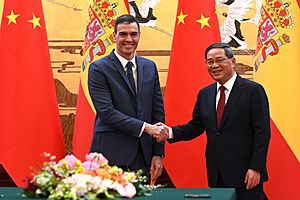
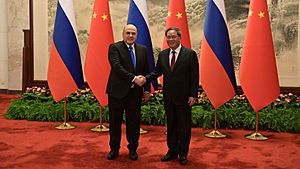
In October 2022, Li Qiang became the second-highest-ranking member of the Politburo Standing Committee of the Chinese Communist Party. This meant he was likely to become the next premier. Some people thought he might rely heavily on Xi Jinping because he had not worked in the central government before. On March 11, 2023, Li Qiang officially became the premier, taking over from Li Keqiang. He is the first premier since Zhou Enlai to move directly from a local government role to premier without first serving as a vice premier.
It was reported that Li Qiang pushed for China to quickly ease its strict "zero-COVID" rules in late 2022, even when Xi Jinping wanted to slow down the process. He also became the head of the CCP's COVID task force and encouraged local governments to continue loosening restrictions.
Domestic Policies
Since becoming premier, Li Qiang has worked to make private businesses feel more confident after the strict COVID-19 rules and government actions. He reportedly even convinced Alibaba Group founder Jack Ma to return to China. Li Qiang has also changed how the State Council (China's main government body) holds meetings, making them more focused on important decisions.
In March 2023, he spoke at the China Development Forum, saying that China would continue to "open up" its economy. He met with many foreign business leaders, including Tim Cook from Apple Inc. and Ray Dalio from Bridgewater Associates. In July 2023, China eased its strict rules on technology companies, and Li Qiang met with tech leaders to show strong support for the industry. Government bodies then introduced policies to help the "platform economy" (like online services) grow and create jobs.
In August 2023, Li Qiang called for more effort to reach China's economic growth goals. In September 2023, he visited technology companies and asked them to focus on making China self-reliant in technology. In November 2023, he was put in charge of a new CCP group that oversees the financial sector. In January 2024, he called for strong actions to stabilize the Chinese stock market.
He visited Hubei and Shaanxi provinces in early 2024 to promote technological independence and encourage investment in research and development. In March 2024, he praised China's economy and promised to make it easier for foreign businesses to operate. In July 2024, he said China's economy was "stable" and called for "scientific policy decisions." In August 2024, he asked for government policies that are "tangible, effective and accessible." In December 2024, he warned local governments not to unfairly fine private businesses. He also visited Zhejiang province, promising to expand access for foreign companies.
In January 2025, Li Qiang visited Shandong province, where he encouraged officials to boost spending, improve electric vehicle charging, and speed up building projects. In February 2025, he called for officials to "turn pressure into motivation" and said China would use specific policies to increase domestic spending. He also visited major telecom companies, asking them to innovate more. In March 2025, he visited Fujian, telling foreign trade companies to find new markets and improve their products. He also spoke at the China Development Forum, saying China was ready for "unexpected shocks."
In April 2025, Li Qiang met with economists and business owners, saying China should use strong policies to deal with global uncertainties. He also called for more support for domestic spending. In June 2025, he attended a ceremony for new government officials, saying the task of developing China was "heavy and difficult." He also visited Jiangsu, calling for more policies on technology, trade, and spending. In July 2025, he visited Tibet and announced a new hydropower project. He also spoke at the World Artificial Intelligence Conference, arguing against "technological monopolies" in AI and suggesting a "world AI co-operation organisation."
Diplomacy
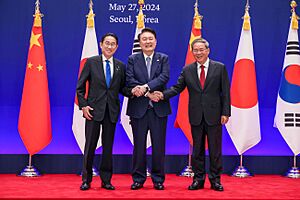
In April 2023, Li Qiang met with Japan's foreign minister to improve relations. In May, he met with Russian Prime Minister Mikhail Mishustin, noting that trade between China and Russia had grown a lot. From June 19 to 21, 2023, Li Qiang made his first overseas trip as premier, visiting Germany and France. He met with leaders and business executives in both countries. He also spoke at the World Economic Forum in Tianjin, where he said China's economy was on track.
From September 5 to 8, Li Qiang visited Jakarta, Indonesia, meeting with leaders from ASEAN (a group of Southeast Asian nations). He also met with leaders from Australia, Japan, and South Korea at various summits. He promised $21.7 billion in new Chinese investments in Indonesia. From September 9 to 10, he attended the G20 summit in India, representing China. There, he met with leaders from Italy, the European Commission, the US, and the UK.
In January 2024, Li Qiang visited Switzerland and Ireland, and attended the World Economic Forum in Davos. In April, he invited Dutch Prime Minister Mark Rutte and German Chancellor Olaf Scholz to visit China. In May, he met with Russian President Vladimir Putin in Beijing. From May 26 to 27, he attended a summit with South Korean President Yoon Suk-yeol and Japanese Prime Minister Fumio Kishida in Seoul. In mid-June 2024, Li Qiang visited New Zealand, where he signed trade and climate change agreements. China offered visa-free travel to New Zealanders, and New Zealand supported Chinese language and cultural programs. In March 2025, he met with US Senator Steve Daines. In May 2025, he spoke at a summit for China, ASEAN, and the Gulf Cooperation Council. He also spoke at the annual WEF meeting in Tianjin in June 2025, saying China would "open its doors still wider to the world."
Political Ideas
Li Qiang is known for supporting businesses and economic changes. He believes in reducing government interference in the market. In 2003, he said that without private businesses, Wenzhou's development would be set back by a century. In 2014, he said there should be "more Alibabas and more Jack Mas." He also said in 2015 that economic changes were very important and that the government should not have unlimited power. He believes that more power should be given to social organizations.
Li Qiang has close ties with Jack Ma, the founder of Alibaba. He reportedly suggested that the government ease its strict rules on businesses and helped businesses talk with the government during a time of crackdowns. Li Qiang also supports new ideas in information technology and artificial intelligence. He believes in focusing on the "real economy" (making actual goods and services).
Personal Life
Li Qiang's wife, Lin Huan, is a retired government worker. They have one daughter, Li Ying, who studied in Australia.
Li Qiang often talks about his connection to Wenzhou, his hometown. He started the World Wenzhounese Conference to encourage people from Wenzhou living around the world to invest back in the city. In 2013, he said, "I was born and bred a Wenzhounese" and that the "Wenzhounese spirit of daring to be the first and especially of strong entrepreneurship has always inspired and nourished me."
In 2024, Li Qiang was named one of the 100 most influential people by Time magazine.
See also
 In Spanish: Li Qiang para niños
In Spanish: Li Qiang para niños
 | Mary Eliza Mahoney |
 | Susie King Taylor |
 | Ida Gray |
 | Eliza Ann Grier |


